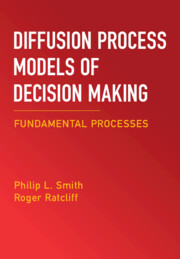Book contents
- Frontmatter
- Dedication
- Contents
- List of Figures
- Preface
- 1 Overview
- 2 Basic Concepts and Data
- 3 Sequential-Sampling Models of Decision Making
- 4 Obtaining Predictions for Diffusion Models
- 5 Empirical Assessment of Sequential-Sampling Models
- 6 Time-Varying Diffusion Models, I. Time Pressure, Urgency, Collapsing Boundaries, and Optimality
- 7 Diffusion Models for Time-Controlled Processing Tasks
- 8 Time-Varying Diffusion Models, II. Detection and Simple RT
- 9 Diffusion Processes Driven by Time-Varying Stimulus Representations in Visual Working Memory
- 10 Neural Diffusion Models, I. Network and Dynamical System Models
- 11 Neural Diffusion Models, II. Poisson Shot Noise and Related Models
- 12 Diffusion Models for Continuous-Outcome Decision Tasks
- 13 Response Confidence
- 14 EZ and Moment Models, Multialternative Decisions, and Expanded Judgment Tasks
- References
- Index
5 - Empirical Assessment of Sequential-Sampling Models
Published online by Cambridge University Press: 26 October 2025
- Frontmatter
- Dedication
- Contents
- List of Figures
- Preface
- 1 Overview
- 2 Basic Concepts and Data
- 3 Sequential-Sampling Models of Decision Making
- 4 Obtaining Predictions for Diffusion Models
- 5 Empirical Assessment of Sequential-Sampling Models
- 6 Time-Varying Diffusion Models, I. Time Pressure, Urgency, Collapsing Boundaries, and Optimality
- 7 Diffusion Models for Time-Controlled Processing Tasks
- 8 Time-Varying Diffusion Models, II. Detection and Simple RT
- 9 Diffusion Processes Driven by Time-Varying Stimulus Representations in Visual Working Memory
- 10 Neural Diffusion Models, I. Network and Dynamical System Models
- 11 Neural Diffusion Models, II. Poisson Shot Noise and Related Models
- 12 Diffusion Models for Continuous-Outcome Decision Tasks
- 13 Response Confidence
- 14 EZ and Moment Models, Multialternative Decisions, and Expanded Judgment Tasks
- References
- Index
Summary
Chapter 5 discusses core experimental findings in the evaluation of sequential-sampling decision models. It compares the response time and accuracy predictions of Wiener and Ornstein–Uhlenbeck (OU) diffusion models to those of the Vickers accumulator and Poisson counter models on three representative data sets. It highlights the relative invariance of the shapes of empirical response time distributions as a function of changes in task difficulty and speed versus accuracy instructions, along with changes in the ordering of distributions for correct responses and errors. The chapter emphasizes that the shape-invariance of empirical response time distributions arises naturally from diffusion models, but is difficult for other models to predict. The OU model, which adds decay to the drift rate of the process, has been advocated on the grounds of neural plausibility, because it represents bounded evidence accumulation. However, an OU model with moderate decay makes predictions that are empirically indistinguishable from those of the Wiener diffusion model and an OU model with large decay predicts response time distributions that are more skewed than are found in data. Empirically, the best-fitting model is the Wiener diffusion model.
Keywords
Information
- Type
- Chapter
- Information
- Diffusion Process Models of Decision MakingFundamental Processes, pp. 92 - 116Publisher: Cambridge University PressPrint publication year: 2025
